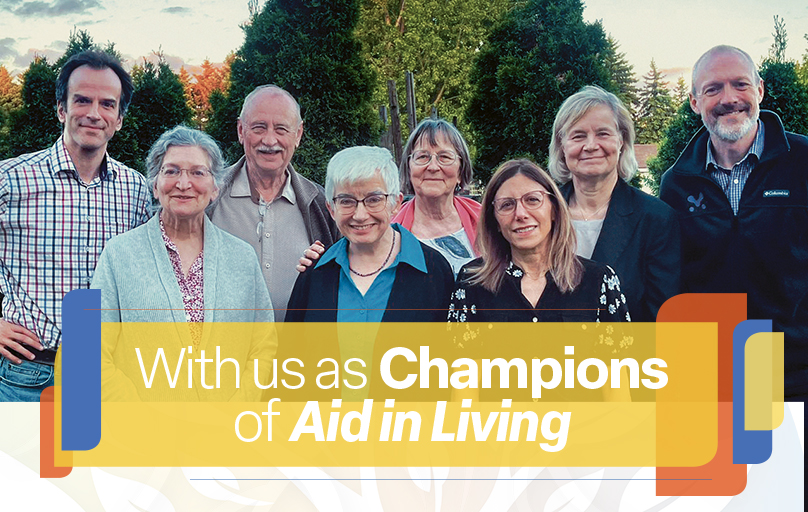Dear allies,
Already the last newsletter before the summer break! On this eve of Canada Day, we would like to present an exceptional book that describes with surgical precision the situation of medical assistance in dying in this country: Unravelling MAiD in Canada – Euthanasia and Assisted Suicide as Medical Care.
We believe that by promoting fact-based initiatives like this one, we can gradually convince people that programmed death is not social progress.
Thank you so much for your support.
We are recharging our batteries for a very busy fall while staying on top of the news on our various networks, at a summer pace.
We will be in touch again soon,
Jasmin Lemieux-Lefebvre
Coordinator
Living with Dignity citizen network
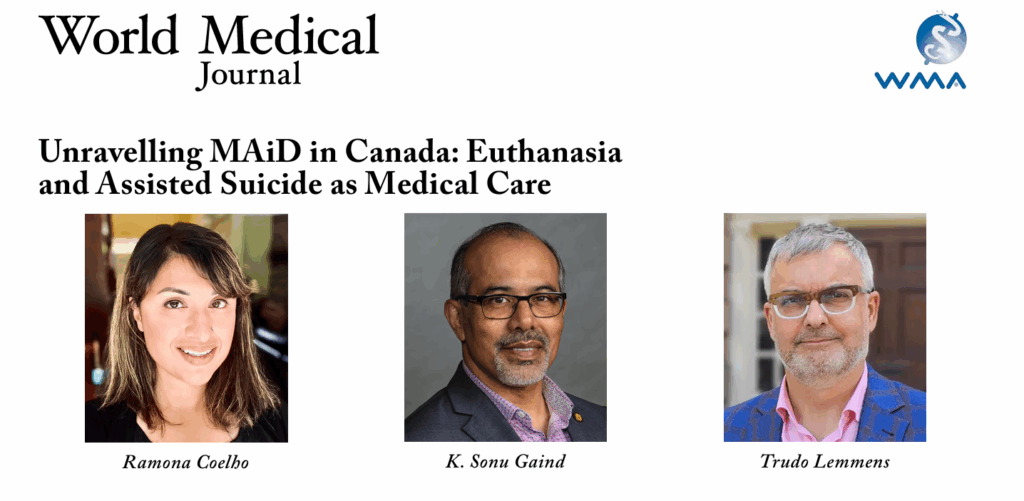
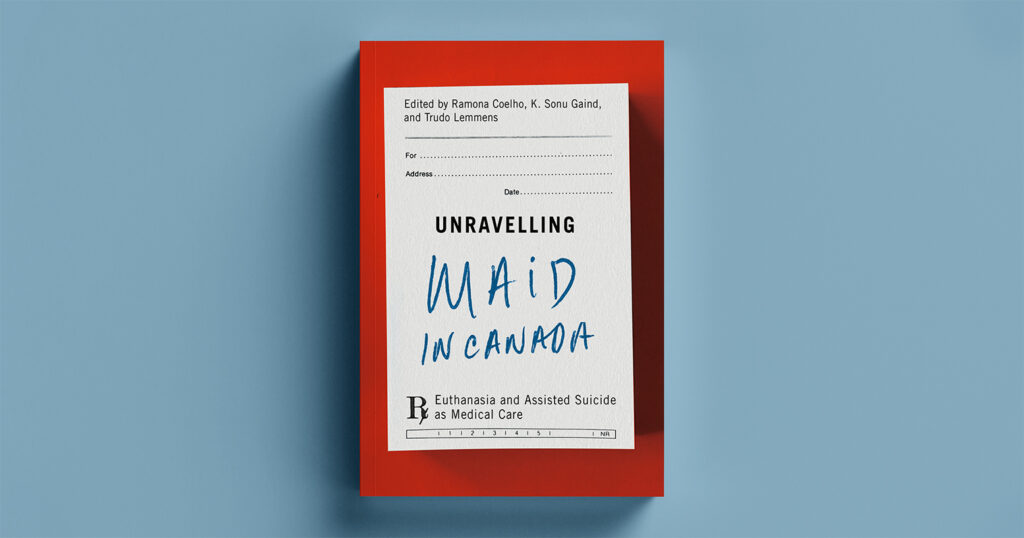
Unravelling MAiD in Canada:
a landmark book
The Living with Dignity citizen network is extremely grateful to the authors of the book Unravelling MAiD in Canada, published in April by McGill-Queen’s University Press.
Dr. Ramona Coelho, Dr. K. Sonu Gaind, and Prof. Trudo Lemmens worked to bring together their thoughts and those of 11 other experts on MAiD in Canada (Alexander I.F. Simpson, Roland M. Jones, Mary J. Shariff, Leonie Herx, Gabrielle Peters, Graydon Nicholas, Isabel Grant, Derek B.M. Ross, Mark Sinyor, Ayal Schaffer, as well as one of our board members, Catherine Ferrier). At 552 pages, it is the most comprehensive portrait of MAiD in Canada to date, favouring a cross-disciplinary approach that addresses ethical, medical, legal, societal, and disability justice rights issues.
In its June issue, the World Medical Journal published an article by the book’s authors (pages 15 to 18). Here is an excerpt:
“One of the striking things, as discussed in several chapters in our volume and also elsewhere, is that even more than in other liberal euthanasia regimes, such as Belgium and the Netherlands, Canada’s law and policy emphasise the need to ensure broad access to MAiD, rather than protecting patients against wrongful death. MAiD is not a last resort, and people who satisfy the broad access criteria can have MAiD, even if standard effective therapies and social support measures could provide relief but have not been tried or are inaccessible. The federal government has also extensively relied on individuals and organisations for policy guidance who have been pushing for the most flexible and open interpretation of the MAiD law. Rather than providing necessary clinical or medical input, many professional medical and psychiatric organisations have uncritically accepted, or propagated, the contested claim that there is a broad right to MAiD and that access must be facilitated. At the same time, these professional organisations have failed to provide the medical evidence that would typically be an expectation in consultations for any medical procedure. They have also refused to provide known evidence of risks to potentially suicidal individuals seeking death and being euthanised.”
You can see and hear the authors of the book in this 1 hour 12 minute panel discussion organized by the Macdonald-Laurier Institute.
To order the book or read several excerpts in Google Preview format: https://www.mqup.ca/unravelling-maid-in-canada-products-9780228023692.php
New bill to block MAiD for mental illness
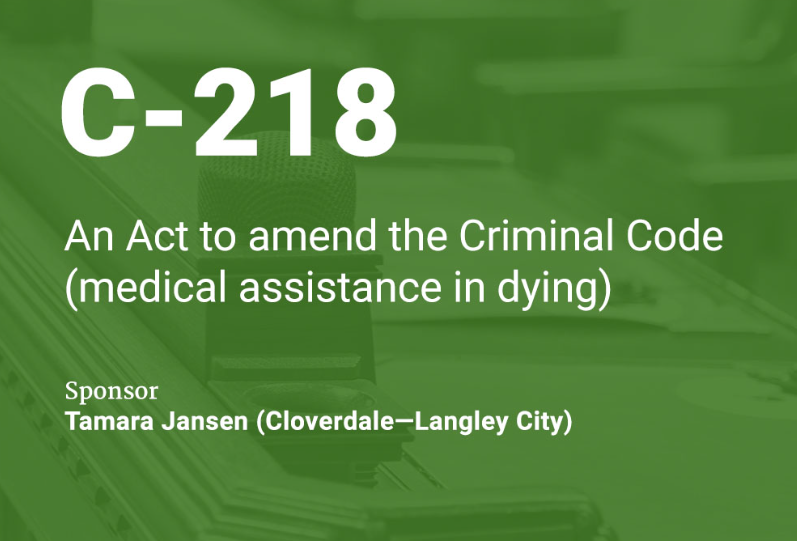
Bill C-218 was introduced on June 20 by Conservative MP Tamara Jansen. This private member’s bill seeks to amend the Criminal Code “to provide that a mental disorder is not a grievous and irremediable medical condition for which a person could receive medical assistance in dying”.
You can read it here:
https://www.parl.ca/legisinfo/en/bill/45-1/c-218
It should be noted that Quebec opposes expanding MAiD where a mental illness is the sole underlying medical condition (MI-SUMC). We hope that this parliamentary initiative will be considered a transpartisan issue.
Two conferences on medical assistance in dying in Québec
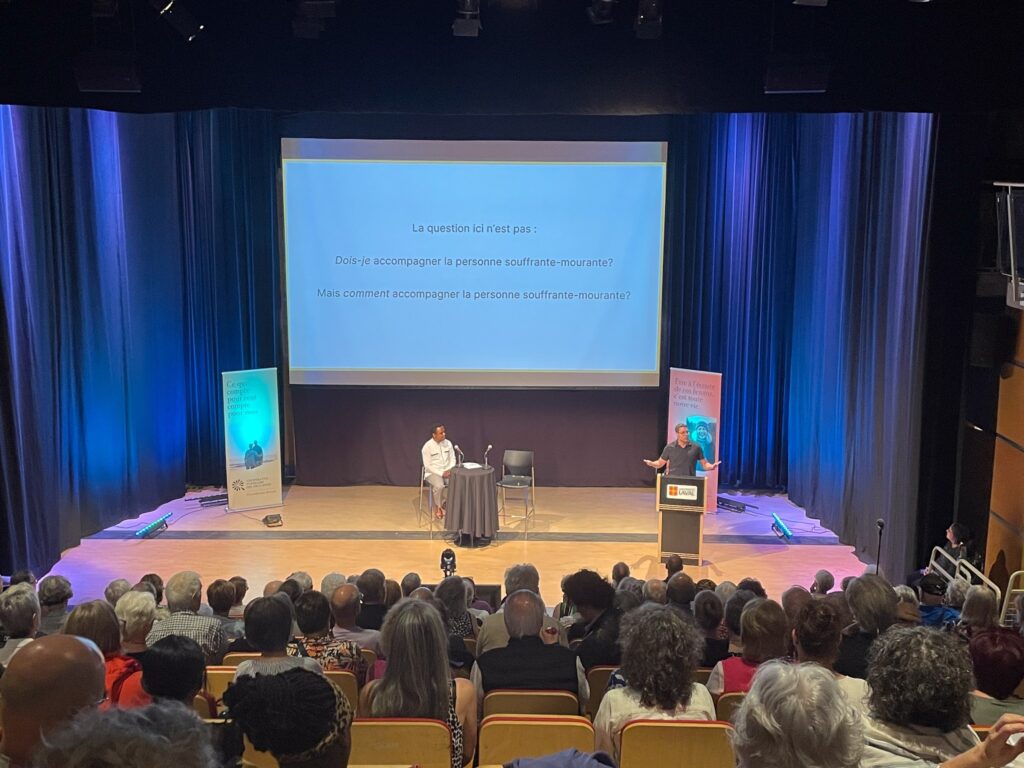
The Coopérative
funéraire des Deux Rives (Quebec City) has organized two conferences in
French on medical assistance in dying in recent months. These conferences
provide “spaces for reflection and discussion to better understand MAiD from
different perspectives.” The organization does not take a position for or
against the practice, but has succeeded in highlighting high-quality resources
for further exploration of the issues surrounding assisted dying.
We
recommend that you listen to these conferences over the summer.
1) Ten years of medical assistance in dying in
Quebec: where do we stand?
Speakers:
– Ariane
Plaisance, independent researcher, Qulysis.com – Promotion of universal
access to palliative and end-of-life care;
– Hugues Vaillancourt, ethics advisor at the Bureau
d’éthique appliquée du CHU de Québec – Université Laval.
2) Medical assistance in dying: beliefs, rituals,
and support
Speakers:
– Gaston
Mumbere, spiritual care worker, CHU de Québec – Université Laval;
– Cory
Andrew Labrecque, Vice-Dean of Studies, Faculty of Theology and Religious
Studies, Université Laval (and member of our board of directors).
Press review
– Our citizen network is featured on the podcast L’anti-chambre d’écho! For audio and video links to this 50-minute interview with our coordinator.
– The Radio-Canada podcast Le labyrinthe de Lyme (The Lyme Maze) addresses important issues regarding MAiD in the context of Lyme disease, which prompted us to publish this blog post.
– Aid in dying: “In Canada, euthanasia has a negative impact on social cohesion” Interview with Jonathan Marchand in the French magazine Usbek & Rica, “the media that explores the future.”
– “I am discovering this: at the time of diagnosis, the child disappears behind the disability. And some time later, we realize that the disability has disappeared behind the child.”
A quote from Anouk Lanouette Turgeon in a column by Nathalie Plaat in Le Devoir highlighting Le Phare Enfants et Familles, a pediatric palliative care home in Montreal.
– The British bill on assisted dying was passed on June 20 by 314 votes to 291. But that does not mean it will come into force immediately. See the BBC report. We stand in solidarity with those who will fight this bill in the House of Lords (equivalent to the Canadian Senate).
– At the Congress of the Société française d’accompagnement et de soins palliatifs (French Society for Accompaniment and Palliative Care), several remarkable speeches were given, including those by politician Jean Leonetti (video excerpt) and the new president of the SFAP, Dr. Ségolène Perruchio (video). The outgoing president of the SFAP, Dr. Claire Fourcade, also expressed herself in these words (our translation – watch on Facebook or read on her LinkedIn page)
We are not rebellious, non-conformist or
resistant out of opposition, we are so because we are commited.
Committed to defending an alternative and more
humane vision of care.
Committed to building bridges between despair
and dignity.
Committed to the silent promise of refusing
indifference.
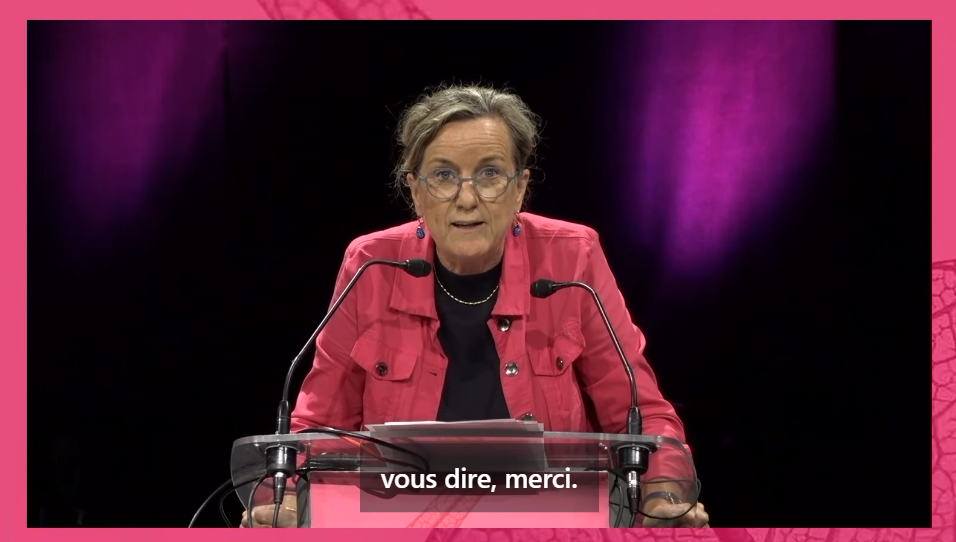
We share the same philosophy.
Thank you from the bottom of our hearts, Claire Fourcade!
JUN
2025


